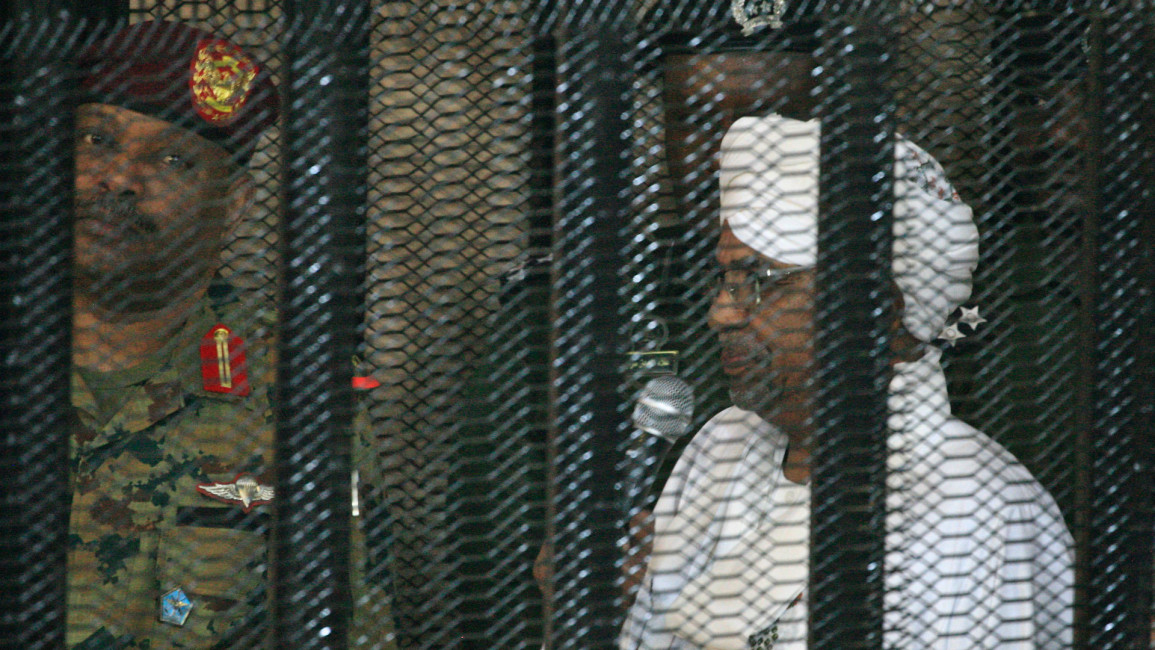Sudan signals desire to try Bashir in hybrid court over Darfur war crimes
Sudan signals desire to try Bashir in hybrid court over Darfur war crimes
Omar Al-Bashir and three other Sudanese wanted by the ICC over alleged war crimes and crimes against humanity in Darfur are currently held in prison.
3 min read
Four ICC indictees are currently in custody in Sudan [Getty]
Ousted president Omar Al-Bashir and three other Sudanese sought by the ICC over alleged war crimes and crimes against humanity in Darfur could be tried in a hybrid court in Sudan, the country's attorney general has said.
The Hague-based International Criminal Court (ICC) and human rights organisations have called for the immediate extradition of Al-Bashir and three others after a fifth indictee, former militia leader Ali Kushayb, surrendered himself to the court last week.
Despite declaring its intention to cooperate with the court earlier this year, Sudan's transitional government has yet to commit to transferring the four suspects to the Hague. All four are currently held in prison.
The decision to extradite the former president, two former officials and a rebel leader requires further consultation, Attorney General Tajelsir El Hibir said earlier this week.
Such consultations are complex and touch on "sovereignty and other legal issues", El Hibir said according to independent Sudanese outlet Radio Dabanga.
Rather than appear before the ICC in person, the Sudanese indictees could instead appear before a hybrid court on Sudanese soil, the attorney general explained.
"It is not the first time international prosecutions will be held outside the ICC. Arusha and Lebanon are good examples," El Hibir said, referring to the International Criminal Tribunal for Rwanda and the Special Tribunal for Lebanon, which investigates and prosecutes those responsible for the 2005 assassination of former Lebanese Prime Minister Rafic Hariri.
To build such a hybrid court in Sudan would require the country to have a fully functioning legal system. Reforms of the Sudanese legal system are still underway following the April 2019 overthrow of Bashir.
A local investigation into alleged war crimes in the Darfur conflict is also ongoing, El Hibir added.
Previous statements by transitional government authorities have indictated that the prosecution of Darfur war crimes suspects could not begin until the conclusion of peace negotiations between Khartoum and rebel groups.
Two other former Sudanese regime officials are sought by the ICC.
Ahmed Haroun, a senior security chief at the time of the conflict and later head of Bashir's ruling party, is accused of coordinating, funding and arming the Janjaweed, an Arab militia allegedly committed genocide, mass rape and other war crimes while leading a counter-insurgency campaign in the country's west.
Also wanted by the court are Abdel Rahim Mohammed Hussein - interior and defence minister during much of the conflict - and former rebel leader Abdallah Banda.
Follow us on Facebook, Twitter and Instagram to stay connected
The Hague-based International Criminal Court (ICC) and human rights organisations have called for the immediate extradition of Al-Bashir and three others after a fifth indictee, former militia leader Ali Kushayb, surrendered himself to the court last week.
Despite declaring its intention to cooperate with the court earlier this year, Sudan's transitional government has yet to commit to transferring the four suspects to the Hague. All four are currently held in prison.
The decision to extradite the former president, two former officials and a rebel leader requires further consultation, Attorney General Tajelsir El Hibir said earlier this week.
Such consultations are complex and touch on "sovereignty and other legal issues", El Hibir said according to independent Sudanese outlet Radio Dabanga.
Rather than appear before the ICC in person, the Sudanese indictees could instead appear before a hybrid court on Sudanese soil, the attorney general explained.
"It is not the first time international prosecutions will be held outside the ICC. Arusha and Lebanon are good examples," El Hibir said, referring to the International Criminal Tribunal for Rwanda and the Special Tribunal for Lebanon, which investigates and prosecutes those responsible for the 2005 assassination of former Lebanese Prime Minister Rafic Hariri.
To build such a hybrid court in Sudan would require the country to have a fully functioning legal system. Reforms of the Sudanese legal system are still underway following the April 2019 overthrow of Bashir.
A local investigation into alleged war crimes in the Darfur conflict is also ongoing, El Hibir added.
|
|
Previous statements by transitional government authorities have indictated that the prosecution of Darfur war crimes suspects could not begin until the conclusion of peace negotiations between Khartoum and rebel groups.
Two other former Sudanese regime officials are sought by the ICC.
Ahmed Haroun, a senior security chief at the time of the conflict and later head of Bashir's ruling party, is accused of coordinating, funding and arming the Janjaweed, an Arab militia allegedly committed genocide, mass rape and other war crimes while leading a counter-insurgency campaign in the country's west.
Also wanted by the court are Abdel Rahim Mohammed Hussein - interior and defence minister during much of the conflict - and former rebel leader Abdallah Banda.
The Darfur conflict broke out in 2003 when ethnic African-origin rebels who complained of systematic discrimination took up arms against the government. The state hit back with violence by the mostly Arab-origin Janjaweed militias.
The United Nations says the conflict killed 300,000 people and displaced 2.5 million.
Agencies contributed to this reportFollow us on Facebook, Twitter and Instagram to stay connected


![Minnesota Tim Walz is working to court Muslim voters. [Getty]](/sites/default/files/styles/image_684x385/public/2169747529.jpeg?h=a5f2f23a&itok=b63Wif2V)




![Debris near Rafic Hariri International Airport [Getty]](/sites/default/files/styles/image_330x185/public/2176162423.jpeg?h=a5f2f23a&itok=MCSK9mkM)
![An Israeli air strike on Jabalia killed teenage journalist Hassan Hamad [Screengrab/X]](/sites/default/files/styles/image_330x185/public/2024-10/hassan%20hamad1.jpg?h=c12e0b96&itok=Rd_dyCVp)
